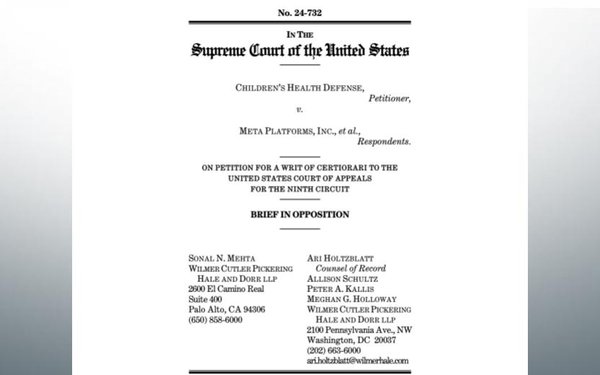
Meta Platforms has asked the Supreme Court to leave
in place a ruling that threw out “censorship” claims by the anti-vaccine nonprofit Children's Health Defense -- an organization formerly led by Health and Human Services Secretary Robert
F. Kennedy, Jr.
In papers
filed this week with the Supreme Court, Meta argues that Children's Health Defense lacks valid claims against the platform for several reasons -- including that the First Amendment protects Meta's
right to wield editorial control over the content on its platform.
“Because Meta is a private actor, the First Amendment bars any injunction compelling Meta to disseminate CHD’s
(Children's Health Defense's) content. Any such order would violate, not vindicate, the First Amendment,” Meta argues.
advertisement
advertisement
The company's argument comes in a legal battle dating to 2020, when
Children's Health Defense claimed its posts and a fundraising tool were wrongly suppressed by Meta.
The organization claimed Meta violated the First Amendment, arguing that the platform was a
“state actor” -- meaning equivalent to the government -- when it took steps to prevent the spread of the group's posts.
The First Amendment generally prohibits the government --
not private companies -- from suppressing speech, but there's an exception that applies when private companies are “state actors.”
Children's Health Defense proposed several
theories to support its claim that Meta was a “state actor,” including that Facebook and the government allegedly worked together to suppress speech, and that Facebook allegedly changed
its vaccine-related policies due to “coercion” by lawmakers.
U.S. District Court Judge Susan Illston in the Northern District of California dismissed the lawsuit, ruling that even
if the Children's Health Defense's allegations were proven true, they wouldn't show that the government coerced Facebook.
The organization then appealed to the 9th Circuit, which ruled 2-1 for Meta.
“Meta has a First Amendment right to use
its platform to promote views it finds congenial and to refrain from promoting views it finds distasteful,” 9th Circuit Court Judge Eric Miller, an appointee of former President Donald Trump,
wrote last year in an opinion joined by U.S. District Court Judge Edward Korman.
Circuit Judge Daniel Collins, also a Trump appointee, dissented, writing that he would have allowed the
Children's Health Defense to pursue a request for an injunction against Meta.
The Children's Health Defense recently petitioned the Supreme Court to review that ruling. The group noted in its
request that Meta CEO Mark Zuckerberg recently told podcaster Joe
Rogan that the company faced “massive institutional pressure to basically start censoring content on ideological grounds.”
Meta counters in its new papers that Zuckerberg has also
said that the company made its own decisions regarding content.
The company points to Zuckerberg's August 26, 2024 letter to Rep. Jim Jordan (R-Ohio), which said: “In 2021, senior officials from the Biden Administration, including the
White House, repeatedly pressured our teams for months to censor certain COVID-19 content, including humor and satire, and expressed a lot of frustration with our teams when we didn't agree.
Ultimately, it was our decision whether or not to take content down.”
Meta writes that where its decisions reflect its own judgment, “they are not fairly attributable to the
government and do not support a state-action claim.”
The Supreme Court hasn't yet indicated when it will rule on the petition.